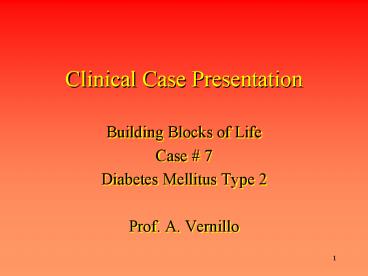Clinical Case Presentation Building Blocks of Life Case # - PowerPoint PPT Presentation
1 / 15
Title:
Clinical Case Presentation Building Blocks of Life Case #
Description:
Clinical Case Presentation Building Blocks of Life Case # 7 Diabetes Mellitus Type 2 Prof. A. Vernillo Template for CCP Include clinical pictures here Type 2 ... – PowerPoint PPT presentation
Number of Views:347
Avg rating:3.0/5.0
Title: Clinical Case Presentation Building Blocks of Life Case #
1
Clinical Case Presentation
- Building Blocks of Life
- Case 7
- Diabetes Mellitus Type 2
- Prof. A. Vernillo
2
Template for CCP
- Chief Complaint (CC)
- History of Chief Complaint (HCC)
- Medications (M)
- Social History (SH)
- Family History (FH)
- Dental History (DH)
- Medical History (MH)
- Review of Systems (RS)
- Diagnosis -Risk Assessment (DRA)
- Differential Diagnosis (DD)
- Treatment (Tx)
- Prognosis (PR)
3
Include clinical pictures here
4
Type 2 Diabetes MellitusA
55-year old obese female has a 15-year history of
type 2 diabetes mellitus. She also has high
levels of cholesterol, high blood pressure, and
anginal pain. She is taking oral hypoglycemics
for her diabetes, medications for her
hypertension, and lipid lowering drugs for her
cholesterol (Lipitor, atorvastatin calcium). She
has redness (erythema) on the roof of her mouth.
She will need a complete upper and lower denture.
She has recently complained of excess urination
during the day and at night, dry mouth, fatigue,
and swings in her blood sugar levels. She
finally admitted to eating cake and cookies.
5
(No Transcript)
6
(No Transcript)
7
Patient
- 55 year old female
- Chief Complaint (CC)
- The roof of my mouth burns and feels dry and I
need dentures. - History of Chief Complaint (HCC)
- The patient complains of fatigue and says that
her blood sugar is very high (over 300 mg) and
at times also very low. She is urinating more
than usual. She wants her dentures so she can
chew comfortably. - Medications
- Oral hypoglycemic, blood pressure medication,
lipid lowering drug
8
- Social History (SH)
- She has had difficulty controlling her weight
most of her life. She is obese. She also admits
to eating cake and cookies. She claims to have
lost 20 pounds over the past year. - Family History (FH)
- She has a mother who is diabetic and a father
with high blood pressure. - Dental History (DH)
- She has had many problems with her teeth. Most of
her teeth were lost because of caries,
periodontal disease, and her neglect. - Medical History (MH)
- She was diagnosed with type 2 diabetes mellitus
15 years ago. She has chest pain (angina),
especially after she walks up a flight of steps.
Her blood pressure was diagnosed approximately 5
years ago.
9
- Review of Systems (RS)
- Cardiovascular Blood Pressure, 140/95. Pulse
80. - Respiratory Rate 17/min.
- Nervous No obvious neuropathology. However, the
patient is dental phobic and uneasy about being
asked questions pertaining to her health. He has
seen the movie, Marathon Man, 4 times. - Endocrine Type 2 diabetes mellitus
- Renal BUN 15 mg/ml (8 to 23 mg/ml) creatinine
0.8 mg/ml (0.6 to 1.2/dL) - Gastrointestinal - unremarkable
- Skin and mucosa Color and texture of skin and
mucosa WNL. No persistent lesions or moles. - Osteoarticular WNL
10
Diagnosis and Risk Assessment
Diagnosis consistent with uncontrolled diabetes
and increased risk for recurrence of oral
infection
11
Dietary Questionnaire
Does not carefully match her intake of
carbohydrate with her medication. She finally
admits to eating cake and cookies.
12
Diagnosis of Diabetes Mellitus
- Fasting blood glucose
- Glucose tolerance test
- Family history
- Signs and symptoms
13
Dental Management of Diabetes Mellitus
- Modification of diabetes medications, if needed
- Determine dietary and medication regimen prior to
treatment - Obtain most recent glycohemoglobin determination
- Have glucose or other readily absorbable form of
carbohydrate available - Determine need for antibiotics
- Know the signs and symptoms of profound
hypoglycemia (A first-rate medical emergency) - Have a glucometer, test strips, and sterile
lancets available to test patients blood glucose - If patient feels nauseous, weak, or has abdominal
cramps or flu-like symptoms, as patient to test
for ketones.
14
Treatment and Prognosis Medications Weight
control/blood pressure control Diet and
exercise Target glycohemoglobin to 6.0 One hour
postprandial glucose excursions (particularly for
type 1 DM) Whenever I get the urge to exercise,
I lie down and wait for the feeling to pass.
Mark Twain
15
Thank You































